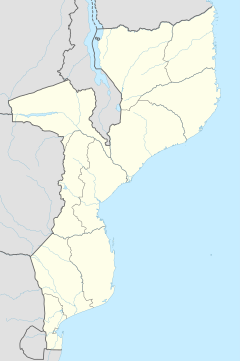Inhambane
|
Inhambane Terra de Boa Gente |
|
|---|---|
| City | |
 Streets of Inhambane |
|
| Streets of Inhambane | |
| Coordinates: 23°51′54″S 35°23′00″E / 23.86500°S 35.38333°ECoordinates: 23°51′54″S 35°23′00″E / 23.86500°S 35.38333°E | |
| Country |
|
| Province | Inhambane Province |
| Founded | 11th century |
| Elevation | 1 m (3 ft) |
| Population (2007) | |
| • Total | 63,837 |
Inhambane, Terra de Boa Gente (Land of Good People) is a city located in southern Mozambique, lying on Inhambane Bay, 470 km northeast of Maputo. It is the capital of the Inhambane Province and according to the 2008 census has a population of 65,837, growing from the 1997 census of 54,157. It is a sleepy historic town known for its rusting colonial architecture and has been popular with tourists in recent years.
The settlement owes its existence to a deep inlet into which the small Mutamba River flows. Two protective sandy headlands protect the harbor and form a sandbank. The town of Maxixe is located across the bay.
Inhambane is one of the oldest settlements on Mozambique's eastern coast. Dhows traded here as early as the 11th century. Muslim and Persian traders were the first outsiders to arrive to the area by sea and traded pearls and ambergris, and they also traded at Chibuene in the south. The area became well known for its local cotton spinning and production by the Tonga tribe. Sometime before the Portuguese reached the area, the Karanga had invaded Inhambane and formed a number of local chieftains. They dominated over the Tonga cotton workers and the rewards of trading with the Muslims went to them.
When Vasco da Gama rounded Africa in the late 15th century, he pulled into Inhambane to replenish stocks and to explore. He took an immediate liking to the area and named it Terra de Boa Gente or 'Land of the Good People'. In 1505, a ship sent by Francisco de Almeida was shipwrecked south of the town, but the Portuguese gained an initial meeting with the Karanga chiefs. Later, their sons landed on Mozambique Island to survey the situation. The Portuguese eventually established a permanent trading post at settlement in 1534. Inhambane was then chosen as the first Jesuit mission to Southeast Africa in 1560.
...
Wikipedia

